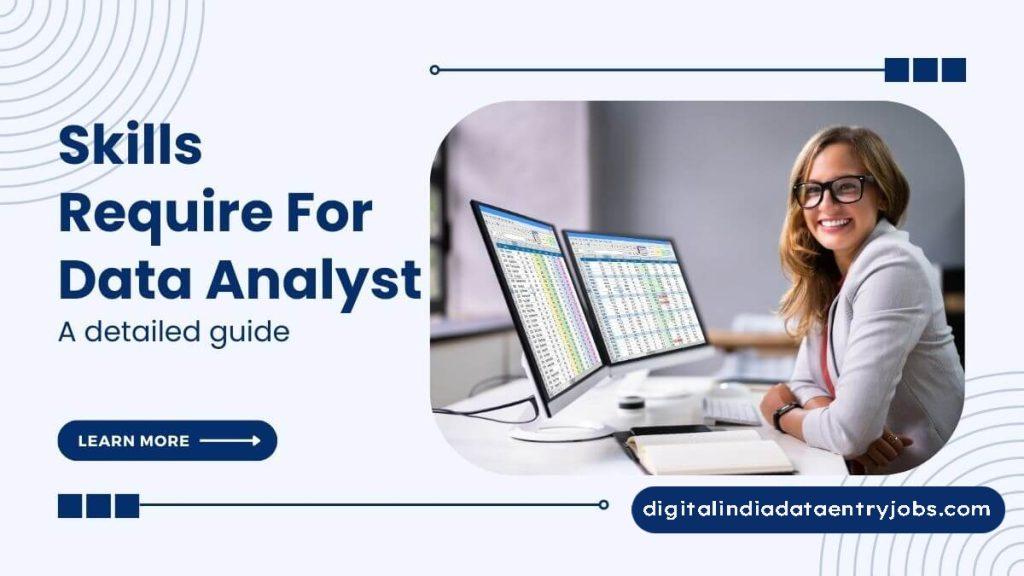Entry Level Data Analyst:- There is no better moment to begin your new career path as a data analyst than right now if you have ever thought about becoming one. Although there is a steep learning curve in data analytics, particularly for newcomers, it is also a very lucrative and fulfilling field to work in. You may have some concerns about the employment market, though, as the majority of entry-level data analytics positions demand some training before you can even consider applying.
We’ll cover all the questions you might have concerning entry-level data analytics positions in this piece. By the time it’s over, you need to know enough to either begin applying or just move on with acquiring the required knowledge.
Contents
What is the role of a data analyst at the entry-level?
All data analysts seek to uncover hidden patterns or trends in data by probing the data in one way or another. They can then utilize these to produce insights that are actionable and meant to address a specific business issue.
The seniority of the post affects the skills required to create these insights. However, you won’t be asked to handle mission-critical duties like setting up data management systems or developing intricate data models by yourself as a rookie data analyst. Rather, you will be assigned significant (if lesser) tasks that are nonetheless crucial to the operation. For example, the following are possible tasks for an entry-level data analyst:
- Analyzing information from particular sources
- Taking care of these data (putting them in relational databases, organizing, and cleaning them)
- Executing simple analysis, maybe with the help of insight tools like Tableau, Microsoft Power BI, and Microsoft Excel
- Using techniques like SQL to query data in relational databases (you will receive on-the-job training as a junior data analyst)
- Producing reports that are accessible to key stakeholders and clearly and succinctly convey your findings
- Building new data integration between internal systems with the assistance
- Refining more general abilities like pattern identification and problem-solving
- Acquiring knowledge of the larger objectives, goals, and procedures of your company (and industry)
The precise duties of any given job are impossible to define because they are all unique. That being said, this gives you a decent idea of what to expect.
As you can see, a junior data analyst may have a wide range of responsibilities. You will be responsible for more complicated data analytics tasks, such as data engineering, as well as more general management duties and software implementation and customization as you advance into mid- and senior-level data analytics roles.

Also Read:- Indian Data Entry Jobs, scholarships gov, Nebsit Council
Which industries employ entry-level data analysts?
What kinds of businesses might entry-level data analysts work in now that we have a general understanding of their duties? Almost every industry you can imagine employs junior data analysts, which is good news. Every element of our life involves data, especially when it comes to the internet. Industries as diverse as finance and retail are leveraging the predictive value of this data.
On the other hand, the following sectors are leading the way in data analytics. Any of these would be an excellent place to start if you’re searching for an entry-level position:
Insurance
In the insurance business, the capacity to analyze risks is crucial. Businesses are constantly looking for qualified analysts because of this. LV=, Allianz and the Zurich Insurance Group are a few reputable insurance companies that employ entry-level data analysts.
Finance
Product development and sales strategies are two areas in finance where data analytics is valuable. Additionally, fraud detection uses it. Talented analysts from all around the world are always in demand by banks like Barclays, Bank of America, and Deutsche Bank as well as businesses like PayPal and American Express.
Accounting and professional services
The biggest accounting companies in the world make it their mission to revolutionize their clients’ businesses. For many years, the “big four” accounting firms—KPMG, Deloitte, EY, and PwC—have been utilizing big data. Because entry-level data analyst jobs demand very specific training due to the nature of the work, they specifically headhunt graduates for these positions. They also provide lots of opportunities for professional advancement.
Healthcare
To enhance patient outcomes, data analysts in the healthcare industry leverage pharmaceutical data and electronic medical records. They apply it to product design as well. Junior data analysts can often find work at AXA, UnitedHealth Group Inc., and pharmaceutical corporations like Johnson & Johnson or Roche.
Big tech
Naturally, some of the more well-known proponents of data analytics are the large IT businesses that we are all familiar with. Companies like Google, Apple, Microsoft, Amazon, and Facebook are always looking to hire entry-level data analysts that they can train to work in the several business areas that they operate in.
In addition to these, there is always a need for junior data analysts in the sciences, retail, IT, agriculture, and education.
Also Read:- Flexjobs Data Entry, indnewsupdates.com, Companycontactdetail
What kinds of positions are open for entry-level data analysts?
Now that we’ve examined the industries with the most need for data analysts, what positions are open? Exist in any way to gain some traction in the field? (Well, that’s a leading question, and the response is in the affirmative!)
Data analytics internships
Looking for a data analytics internship is one approach to get practical experience in the field. Particularly large companies may hire fresh graduates or students to give them a taste of what the position entails.
In addition, you might be able to secure a full-time position if you perform well throughout your internship. If you think that’s the route you should go, how about you look for a company you want to work for and get in touch with the chief data scientist or head of data analytics to see if they would consider hiring an intern? One thing to keep in mind is that many businesses do not compensate their interns. We don’t like this, to be honest. However, if you feel comfortable working for free to get experience, then that’s your call. Nobody’s going to judge you for it.
Data analytics apprenticeships
Why not think about an apprenticeship if you dislike the concept of an internship? Because of their connections to the local business community, many community colleges and other providers of vocational training can help you acquire the data analytics skills you need in the classroom and then use them in the workplace through an apprenticeship.
The best thing about apprenticeships is that they help you get more skilled for a certain company while acclimating you to the working environment. An added perk is that they are typically paid!
Degree apprenticeships are another increasingly popular alternative for higher-level expertise. These offer longer durations of instruction (years as opposed to weeks or months) along with one or more apprenticeship assignments. This not only equips you with deeper abilities but allows you to experience working for numerous different employers.

What credentials and abilities are required to apply for and be hired for an entry-level data analyst position?
We noted in section 4 that the company and job description will determine the abilities required to secure a junior data analyst position. Smaller start-ups that prioritize experiential learning might be open to hiring novice data analysts with little to no prior expertise. Rather, you will be required to learn things on the job.
Given this, what kinds of abilities do these employers instead search for? Put simply, they’ll be looking for more general talents that show you can learn new things and are willing to do so. As an illustration:
- Making choices and resolving issues
- Critical and imaginative thinking
- Strong interpersonal and communication abilities
- Self-knowledge and compassion for others
- Drive and proactivity
- Collaboration and guidance
- Reliability and resilience, such as the capacity to function under duress
But more often than not, you’ll need to combine these “life skills” with technical know-how to get your first entry-level position. Larger firms in particular will want you to start working right away. In this scenario, you’ll probably need:
- An undergraduate degree, preferably with a focus on computer science or data
- Proficiency with statistical programming, such as Python or R
- Familiarity with SQL and relational databases
- Proficiency with the statistical features of Microsoft Excel
- The capacity to use Tableau or other tools to produce data visualizations
- Strong statistical and mathematical abilities
- Automation and machine learning theory (a bonus, but not required for entry-level data analyst jobs)
The majority of employers will be searching for these kinds of competencies. As always, though, start by reading the job description.
Also Read:- Max Data Entry Services, Digitizeindiagov, Onlinereferjobs

What is the typical wage for a data analyst at entry level?
Let’s get right to the important stuff: What is the salary range for entry-level data analyst positions?
Indeed, Glassdoor, SimplyHired, Salary.com, Salary Expert, and Payscale are some of the job and salary comparison websites that report that entry-level data analyst salaries in the US average approximately $46,000 per year. This is reasonable pay for a junior data analyst position.
Of course, there are a lot of other factors besides your skill level that affect your earning potential. Some of these factors include the industry you work in, the position’s location, and even the team size. Based on several variables, this post provides you with an estimate of the possible compensation range for an entry-level data analyst.
For additional information on possible earnings as your career progresses, view our guide on data analyst salaries. It contains more figures for all roles, not only junior ones but also for senior and mid-level positions.
#Saras

